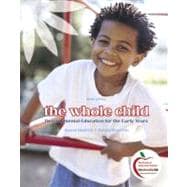
Joanne Hendrick is professor emerita of early childhood education from the University of Oklahoma. In addition to raising four children of her own, her practical experience includes working with children at the Stanford Speech and Hearing Clinic, directing a parent-child workshop, working in Head Start, and chairing the early childhood areas at Santa Barbara City College and the University of Oklahoma. She holds an undergraduate degree from Stanford University in disorders of speech and hearing and graduate degrees from the University of California in counseling and early childhood education. She is past president of the California Association for the Education of Young Children.
Her current interests include gardening, photography, traveling to exotic places, writing about young children, and enjoying her ten grandchildren.
Dr. Patricia Weissman is co-author with Joanne Hendrick of two renowned early childhood college textbooks: The Whole Child: Developmental Education for the First Early Years (Merrill/Prentice Hall, 2006) and Total Learning: Developmental Curriculum for the Young Child (Merrill/Prentice Hall, 2007). She began her early childhood career as a family care provider for two infants. Having found her calling, she studied early childhood education in the master’s program at San Francisco State University and received a doctorate of education from the University of San Francisco. During the past 30 years, she has worked as an infant caregiver, preprimary teacher, children’s center director, Child Development Associate (CDA) advisor, professor of early childhood education, and a research associate in early childhood development at the Merrill-Palmer Institute of Wayne State University. She was the founding editor of the journal Innovations in Early Education: The International Reggio Exchange. Dr. Weissman also designed and consulted on the production of the Public Broadcasting Service video series entitled The Whole Child: A Caregiver’s Guide to the First Five Years. Dr. Weissman is the mother of two adult children whom she feels turned out "quite well."
| Normal 0 false false false MicrosoftInternetExplorer4 | |
| What Is Good Education for Young Children? | |
| Realize You Are Part of a Noble Profession Can Early Childhood Make a Difference? | |
| Brain Development Research | |
| Effects of Early Childhood Education | |
| Research Implications for Teaching Theoretical Foundations of Early Childhood Education | |
| Developmental Approaches Psychoanalytical | |
| Theory Family-Ecological | |
| Theory Active Learning, Constructivist Theories | |
| Behaviorist or Learning Theory | |
| From Theory to Practice Types of Early Childhood Education | |
| All Programs Include Children with Special Needs | |
| Center-Based Care | |
| Family Child Care | |
| Public School Programs A Final Thought About Programs Basic Premises of This Book Putting Premises Into Practice | |
| Planning a Good Day For Children Good Human Relationships Are a Fundamental | |
| Ingredient of a Good Day Families | |
| Must Be Included as Part of the Life of the School High-Quality Education | |
| Must Be Developmentally Appropriate High-Quality Education | |
| Is Individualized High-Quality Education | |
| Honors Diversity in Its Many Forms High-Quality Education | |
| Uses Reasonable and Authentic Methods of Assessment to Find Out More About the Children High-Quality Education | |
| Has a Balance Between Self-Selection and Teacher Direction; Both Approaches Are Valuable High-Quality Education | |
| Should Be Comprehensive High-Quality Education | |
| Has Stability and Regularity Combined with Flexibility High-Quality Education | |
| Has Variety Learning Must Be Based on Actual Experience and Participation The Program Should Be Reflected on Daily High-Quality Education | |
| Promotes Ethical Standards for Teachers High-Quality Education | |
| Should Encourage Advocacy The Day Should Be Pleasurable | |
| Working with Families | |
| Opening the Door to Good Communication | |
| Understanding Families | |
| Family Diversity Challenges to Working with Families | |
| Suggestions for Establishing a Good Relationship Between Family and Teacher | |
| What If The Relationship Is Not Good? | |
| The Preamble: What to Do Before the Situation Arises Coping with the Initial Encounter | |
| What to Do When That Button Is Pushed What to Do After the Complainer Departs | |
| The Return Engagement Maintaining Good Relationships | |
| Keeping the Lines of Communication | |
| Open Counseling with Families Practical | |
| Pointers about Conducting a Conference | |
| Avoid Interruptions Beginning the Conference | |
| During the Conference, Stay as Relaxed as Possible | |
| Drawing the Conference to a Close | |
| What to Do After the Conference Finally, Remember | |
| That Information Shared by Parents | |
| During a Conference | |
| Is Confidential Limits to Guidance Work Beyond the Conference | |
| Further Strategies for Involving | |
| Families Families in Crisis What Constitutes a Crisis? | |
| Some General Principles for Helpin | |
| Table of Contents provided by Publisher. All Rights Reserved. |
The New copy of this book will include any supplemental materials advertised. Please check the title of the book to determine if it should include any access cards, study guides, lab manuals, CDs, etc.
The Used, Rental and eBook copies of this book are not guaranteed to include any supplemental materials. Typically, only the book itself is included. This is true even if the title states it includes any access cards, study guides, lab manuals, CDs, etc.